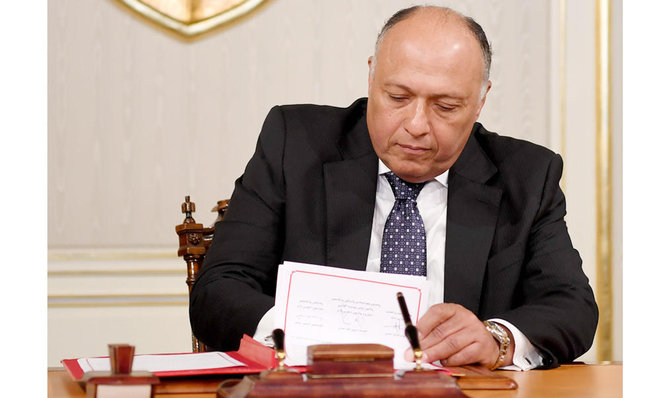Cairo – Conflicts in the Arab region, most notably in Syria, Libya and Yemen, should be resolved, stressed Egyptian Foreign Affairs Minister Sameh Shoukry.
The minister added there is a possibility to contain terrorism through Western intelligence agencies, not just military operations.
Speaking to Asharq al-Awsat, the FM said that certain known factories are providing terrorist organizations with arms and equipment, calling for serious and effective cooperation to end this.
Shoukry pointed out that the US administration shares the same vision as Egypt in countering terrorism. He also discussed the situation in the region and the importance of giving people a chance to end their struggles and solve their problems.
When asked if there were any initiatives for a solution in Yemen, Shoukry replied that they are monitoring the UN envoy and other countries’ efforts to establish a resolution according to the agreed bases, such as the outcomes of the national dialogue, the Gulf initiative and supporting the legitimacy.
On terrorism, the FM stressed that Egypt will continue to fight it, especially after the two attacks on the Tanta and Alexandria Churches earlier in April.
Shoukry stated that he believes terrorism is expanding because the international effort that has been established did not succeed in containing terrorism, except in Iraq recently.
He added that the situations in Syria and Libya are complicated and terrorist organizations are spreading in Africa. He also cited the frequent attacks in Europe and Egypt that are evidence of the continued presence of these terror organizations.
According to the minister, the international community should “credibly tackle the matter because it is impossible that these organizations receive weapons and support unbeknownst to the western intelligence.”
Shoukry said: “If there a real international will to fight terrorism, then the international community should begin with determining how these terrorist organizations receive all these advanced weapons and equipment.”
The FM said it is “impossible” that intelligence agencies are unable to trace and determine the parties and states responsible for backing terrorist organizations. He added that this is crucial for the credibility of anyone who says they are fighting terror.
Commenting on Egyptian President Abdul Fattah al-Sisi’s recent trip to the US, Shoukry explained that it took place shortly after US President Donald Trump came to office and when the US policy was still being shaped.
He did say however certain concepts were agreed upon, like fighting terrorism.
When asked whether Egypt will continue to unite all three Libyan parties, Shoukry stressed that his country never did and never will stop trying to unite Libyan parties. He explained that there are three institutions in Libya: presidential council, the parliament and the state’s council, which will form a committee to agree on the amendments needed to the Sukhayrat agreement.
He added that this constant effort with Libyan leaderships, which have met with Egyptian officials in Cairo, will continue until they are successful.
The minister stressed that Egypt aims to have natural relations with regional countries according to certain bases, which include mutual respect for sovereignties.
Furthermore, Cairo does not interfere in internal affairs and does not support organizations that back terrorism.
The FM was in Sudan recently on a visit, which he described as having “positive outcomes”.
He stated that it was an opportunity to review bilateral relations and the outcomes of the meetings of the joint high committee. He also explained that Egypt and Sudan agreed on a mechanism for political dialogue and discussed the regional situation.
The minister stated that bilateral relations might have had some misunderstandings or misinterpretations, which drove brotherly relations off their track.
When asked if the past has been forgotten, Shoukry stressed that Cairo is committed to a strategic ties with Sudan, which goes beyond any special relationships, adding: “Egypt does not conspire against or interfere in the affairs of any state.”
On Ethiopia, Shoukry said that both Cairo and Addis Ababa requested better coordination and asked for more frequent meetings. He explained that this could make it clearer to the public that issues are being discussed frankly and openly.
When asked about the Egyptian-Ethiopian relations, Shoukry said that Ethiopian FM Workneh Gebeyehu conveyed his country’s prime minister’s message to Sisi during his recent visit to Cairo. He added that the visit was an opportunity to discuss the importance of the mutual relations which are based on respect and common interests.
The Ethiopian FM stressed publically that his country will not take any move that could harm Egyptian interests. Meanwhile, Shoukry confirmed that Egypt is concerned with the Ethiopian development efforts, expressing Egypt’s willingness to be part of it through investments.
Shoukry said that the two countries agreed on dialogue to reach an ongoing mechanism to hold meetings every two months in order to discuss any misunderstanding or misinterpretation that could lead to wrong assumptions.
